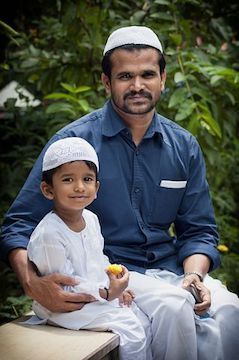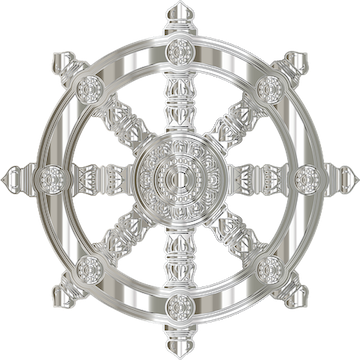The Buddhist 10 Fold Path
RIGHT LIVELIHOOD

The Buddha doesn’t only have instructions and advice for monks and laypeople in general, he also provides specific teachings for families, the community, their welfare and wealth, and what a good relationship is about in the Buddhist context.
1. The family

There are a great number of teachings on family relationships, and many of them show that the Buddha regarded the family as as important aspect of a healthy society. Since the head of the family has a powerful impact on his household, the Buddha promoted a positive transformation of society. For the family, the Buddha asks for the head of the family to have confidence, which has a positive impact on the whole family:
“So too, when the head of a family is endowed with confidence, the people in the family who depend on him grow in three ways. What three? (1) They grow in confidence; (2) they grow in virtuous behavior; and (3) they grow in wisdom.” — AN I.152
“Monks, whatever families do not last long after attaining abundance of wealth, all do not last long for four reasons, or a particular one among them. What four? (1)They do not seek what has been lost; (2) they do not repair what has become broken; (3) they overindulge in eating and drinking; or (4) they appoint an immoral woman or man to be their chief.” — AN II.249
“There are, headman, eight causes and conditions for the destruction of families. Families come to destruction on account of authority (1), or on account of thieves (2), or on account of fire (3), or on account of floods (4); or they do not find what they have saved up (5); or mismanaged investments fail (6); or there arises within a family a wasteful person who squanders away its wealth (7); and impermanence is the eighth [what is impermanent, is suffering].” — SN IV.324
2. Parents and children

For parents and their children, the Buddha asks to support each other and encourage other family members in virtue and wisdom:
“But, monks, if, when one’s parents lack confidence, one encourages, settles, and establishes them in confidence; if, when one’s parents are immoral, one encourages, settles, and establishes them in virtuous behavior; if, when one’s parents are selfish, one’s parents are unwise, one encourages, settles, and establishes them in wisdom: in such a way, one has done enough for one’s parents, repaid them, and done more than enough for them.” — AN I.62
“‘Brahma, monks, is a designation for mother and father. ‘First teachers’ is a designation for mother and father. ‘Gift worthy’ is a designation for mother and father. For what reason? Mother and father are helpful to their children: they raise them, nurture them, and show them the world.” — AN I.132
“Monks, considering five prospects, mother and father wish for a son to be born in their family. What five? (1) ‘Having been supported by us, he will support us. (2) Or he will do work for us. (3) Our family lineage will be extended. (4) He will manage the inheritance, (5) or else, when we have passed on, he will give an offering on our behalf.’” — AN III.43
3. Husbands and wives

The Buddha encourages all to see the benefit and result of a well established family, when both husband and wife live a righteous life:
“[When] Both husband and wife are endowed with confidence, charitable and disciplined, living their lives righteously, addressing each other with pleasant words. Then many benefits accrue to them and they dwell at ease. Their enemies are saddened when both are the same in virtue.” — AN II.59
“One who rejoices when she sees her husband as if seeing a friend after a long absence; well raised, virtuous, devoted to her husband: a wife like this is called a wife and a friend.” — AN IV.93
4. Present and future welfare

When confidence, virtue, and wisdom grows and is established in the family, the welfare of the family grows as well. The teachings give an example of how we long for worldly matters, and as a cause, how accomplishments in the Buddhist path lead to the acquisition of present and future welfare:
“Householder, there are these four things that are wished for, desired, agreeable, and rarely gained in the world. What four? Wealth, fame, long lasting life, and favorable rebirth.” — AN II.66
“There are, householder, four [other] things that lead to obtaining those four things. What four? Accomplishment in confidence [in the enlightenment of the Buddha], accomplishment in virtuous behavior, accomplishment in generosity [avoiding selfishness], and accomplishment in wisdom [of avoiding greed, ill will, drowsiness, restlessness, remorse, and doubt].” — AN II.66
“He always does his duty toward his parents; he promotes the welfare of his wife and children. He takes care of the people in his home and those who live in dependence on him.” — AN III.78
5. Right and wrong livelihood

Doing business in a virtuous matter has positive consequences in this life, but also in the next life. The Buddha also points at five types of trade that one should not engage it at all:
“Someone else approaches an ascetic or a brahmin and invites him to ask for what he needs. He gives it to him and surpasses his expectations. When he passes away from there, if he comes back to this world, whatever business he undertakes surpasses his expectations.” — AN II.82
“Monks, a lay follower should not engage in these five trades. What five? Trading in weapons, trading in living beings, trading in meat, trading in intoxicants, and trading in poisons.” — AN III.208
6. Wealth
Actions have consequences, and the negative ones lead to suffering. It is better to replace these with positive thoughts and actions, that in turn lead to pleasing results:
“So, monks, for one who enjoys sensual pleasures, poverty is suffering in the world;
getting into debt is suffering in the world; having to pay interest is suffering in the world; being reproved is suffering in the world; prosecution is suffering in the world; and imprisonment is suffering in the world.” — AN III.352
“Monks, there are these five benefits in wealth. What five?

By means of wealth:
- one makes oneself happy and pleased and properly maintains oneself in happiness;
- one makes one’s parents happy and pleased and properly maintains them in happiness;
- one makes one’s wife and children, workers, and servants happy and pleased and properly maintains them inhappiness;
- one makes one’s friends and companions happy and pleased and properly maintains them in happiness;
- one establishes for ascetics and brahmins an uplifting offering of alms that is heavenly, resulting in happiness, and conducive to heaven.” — AN III.259
7. The community

A good community is like an extended family, and the Buddha provides a list of advice given for the community to adopt as beneficial practice:
“And what, Licchavis, are the seven principles of non-decline?
- assembling often and hold frequent meetings
- assemble in harmony, adjourn in harmony, and conduct the affairs in harmony
- do not decree anything that has not been decreed or abolish anything that has already been decreed
- honor, respect, esteem, and venerate the elders and think they should be respected
- not abduct women and girls from their families and force them to live with them
- honor, respect, esteem, and venerate their traditional shrines, both those within [the city] and those outside, and do not neglect the righteous offerings as given and done to them in the past
- provide righteous protection, shelter, and guard for arahants, [with the intention]:
‘How can those arahants who have not yet come here come to our realm, and how can those arahants who have already come dwell at ease here?’”— AN IV.17
In the next post No. 6 of the path will be discussed: Right effort.

The Nikayas are Buddhist books that form the earliest Buddhist canon of scriptures containing the teachings of the Buddha.
Today we’re going to be examining the Eight Fold Path, and even more so, the Ten Fold Path that is not as well known.
First of all, it really helps to have these books in digital form, so you can search for a particular word easily and be able to read how it is mentioned and in what context it is placed in the teachings of the Buddha.
The following English translations of the primary texts are available and used:
- The Connected Discourses of the Buddha: A Translation of the Samyutta Nikaya (SN)
- The Long Discourses of the Buddha: A Translation of the Digha Nikaya (DN)
- The Middle-Length Discourses of the Buddha: A Translation of the Majjhima Nikaya (MN)
- The Numerical Discourses of the Buddha: A Translation of the Anguttara Nikaya (AN
B. The Virtue and Moral Discipline aggregate of training
- Right speech (samma-vaca)
- Right action (samma-kammanta)
- Right livelihood (samma-ajiva)
C. The Concentration aggregate of training
- Right effort (samma-vayama)
- Right mindfulness (samma-sati)
- Right concentration (samma-samadhi)
The Ten-fold Path consists of two additional ‘folds’:
- Right knowledge / wisdom (samma-nana)
- Right liberation / release (samma-vimutti)
- AN = Anguttara Nikaya,
- DN = Digha Nikaya,
- MN = Majjhima Nikaya,
- SN= Samyutta Nikaya); followed by book number in roman capitalized numerals and verse number (for example, AN I.30 = Anguttara Nikaya book 1 verse 30).
Note: Quotations follow the PTS (Pali Text Society) naming and numbering format:
I will flag comment spam at 1% strength. If you keep on spamming my post I will flag you at 100%. I don't care if you have limited English abilities write a couple sentences about this article, no copy-paste please. I will flag: one sentence comments, links to your blog and begging for up-votes and follows. Also I will flag comments that have nothing to do with my blogs article. I will also check your comment section to see if you have been comment spamming on other blogs.


 A link to My Blog
A link to My Blog
I am happy you are sharing your faith though I am not a Buddhist. I wish more folks would share their spirituality. I would upvote as I always do but I was hacked Friday and will take at least a week to get voting power. I was scammed sadly. They sent me to Steewit rather than keeping me on steemit I blogged about it. Again thanks for your spirituality. Blessings - Troy
I suspect someone has been trying to get into my account through my safari browser ...it was the oddest thng @logan83 account name kept showing in my login account name when I tried to log in...thank goodness I use only my posting key when logging into steemit. I never use my master key at all!
One time I miswrote my master key and had to go through the recovery process. Thank goodness I had saved my old master key!
I don't know if Buddhism is a religion to me, it is like a map and a philosophy. i know for those who are born into Buddhist traditions it is a religion. I was raised Christian but the Churches have been invaded by wolves and no longer teach Christian virtues like in the bible. So I went to a Buddhist teacher and asked for teachings on how to discipline the mind and develop wise loving kindness.
It worked and now if I want to pray to the Christian God he will hear my pure heart instead of my fear and ignorance!
Well I learned a hard lesson to use my posting key. I lost 663 in SBD from their scam Protect yourself. Thanks again.
Now I am thinking about moving most of my steem and sbd into savings ...OMG, I am so sorry <3
If you have time I encourage you to go to my blogs and read my story on being scammed. Blessings. Troy
Every religion teaches treat family with respect and care :) great teaching by buddism
That is what I have found in my studies @munazza
Strong healthy families build strong healthy communities!
Yes i have noticed no one can love you more than your family :) You always write for the betterment of society :)
Its very interesting blog. I must say it is an inspirational writing. Bhudda says about family in his famous quote “A family is a place where minds come in contact with one another. If these minds love one another the home will be as beautiful as a flower garden. But if these minds get out of harmony with one another it is like a storm that plays havoc with the garden”
Family is what the result of love. Where there is love there is family. All humans are just like a one family if all of us know the real face of humanity
Love and peace 👍🏻
I love the garden quotes, they are mentioned in all the religions I've studied and I garden as well so I understand. Thank you @uzairkhan622 <3
Our family and community are the most important thing next to an equanimous mind. Without a level mind the stress from family and community can lay steal away one's peace.
You are welcome dear @reddust
As you are saying that the stress of family will steal one’s peace, I agreed but not fully agreed. Because when there is love in a family the stress will not even dare to knock the door of that family. Love is the most
Powerful thing in family. Second thing is understanding, it also comes when there is love. So in love there is peace and prosperity.
If one loves their family and has a steady heart stress can not break through. I agree, but I was speaking from my experience. I raised 4 children and I had to deal with an abusive alcoholic husband when my children were young, its a long story but with a happy ending.
That's one of the reasons why I went and found a Buddhist teacher, I needed a steady mind to deal with the stress. Praying just didn't cut it when life goes crazy....I needed lessons on how to develop wisdom and equanimity.
I will also pray for you dear. May your life become full of happiness and joys. As a brother I want to say you something. Life is too short to worry about stress and tension, regret nothing, and don’t let people bring you down.
Always hope for the best. Success always comes after failure. You have to fight with your sorrows and you will have to make your life happy. I appreciate you because you are a strong girl. 👍🏻
As you see here in steemit. We are all just like family. We are living in a family. People like you make us motivate to do something for humanity. Here we will help each other by reading each other’s blogs. Because for every startup there is a stimulus and I think here in steemit the best stimulus is to encourage each other and also to appreciate one another
I try and help but sometimes I feel overwhelmed just trying to write my blog and create my art. I do feel steemit is a big family and I try and set a good example. Thank you so much for an enlightening conversation.
You are welcome dear. Stay happy and blessed. :)
You are welcome dear. Stay happy and blessed. :)
this is mean Match behavior of the heart and tongue
Define: mean...
actions speak louder than words!
I do not comment anything. because i am islam
I came in just to show how faithful I am to you.
although I often receive flags from you.
You don't have to post on my Buddhist blog my friend, we had a lovely conversation regarding my painting. I am trying to help people curate correctly and earn rewards. The flagging isn't done out of anger. If you don't agree with a post do not comment. I will understand and this will help build a healthy network out of respect.
I appreciate you. and you are my family. I will follow and comment your post. have you seen 1000 of my followers. you are the most special person I mentioned in my post.
Every word of your mind, you wrote very well. Hopefully you'll be giving us a good post like this.
I would like to say you keep it up and well done.
Thank you @tetas08
@reddust My friend you mostly welcome.
This is a sequel to the previous topic!
Yes this is a 10 part series @soufianechakrouf, thank you.
Ok
Pleasure!
in life we always keep altruism in our family happy always.
Our family is one of the most important things in this world <3
well tats really a good thing which i read out there got some really good information
This post has received gratitude of 6.05% from @appreciator courtesy of @reddust!